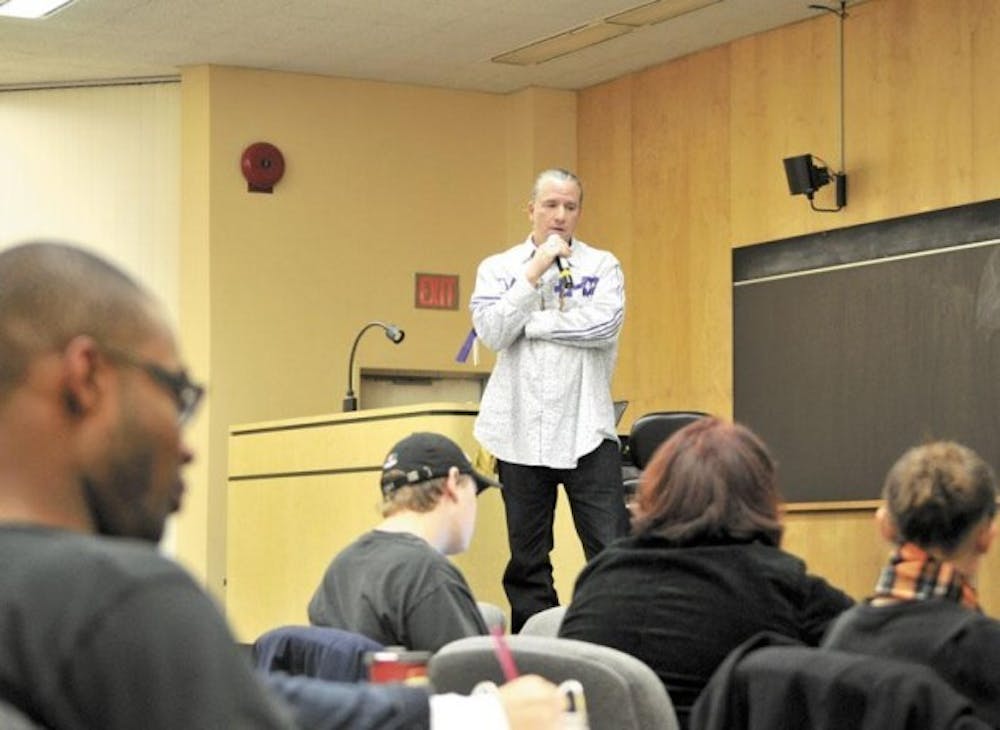Last Monday, Americans all over the country recognized Columbus Day. They celebrated Columbus' discovery of the New World and the birthplace of America.
Some students were upset by the holiday - some because classes were not canceled, others because it was the celebration of a serial killer.
Columbus Day, a holiday celebrated in this country for over 500 years, is observed in 41 states, honoring the man that discovered America. Christopher Columbus is portrayed as a hero in American history. But in the eyes of others, he holds a different title: a rapist and murderer.
UB's Native American People's Alliance (NAPA) and Native Graduate Association (NGA) feel strongly about the hidden truths of Christopher Columbus and his voyage to the Americas.
"As [Dr. Donald Grinde, a UB American studies and history professor] quoted a writer in his speech earlier, 'giving Columbus credit is like giving Hitler credit for the Holocaust,'"said Erika Seneca, a junior communication major and vice president of NAPA. "He came across the ocean and killed and raped my ancestors."
In light of the nationally recognized holiday, both NGA and NAPA tabled outside the Student Union to commemorate their Native American ancestors and the struggles they faced during Columbus' expedition to the Americas.
For the past couple of years, NGA and NAPA have kept the tradition alive. A microphone system setup allowed for a more open and productive event this year. People were able to speak about their views of Columbus Day.
"We have a reinforcing condition that this guy is a hero and discoverer of our country, but nobody knows who this guy really is," said Lou Williams Jr., president of NGA. "There's a lot of disgusting things that Columbus was involved with and did not protest against."
Being Native American himself, with descendants from the Oneida tribe, Williams has been involved with numerous groups besides NGA and NAPA. He has demonstrated against Indian mascots, participated in awareness events similar to the one at UB and protested at The School of the Americas in Georgia.
Stories of rape, murder and violence were a few of the many incidents described that Columbus and his shipmen were accountable for.
"Columbus gave one of his generals a woman to do the inconceivable with and in the writing he explains how he takes her down and he rapes her," Williams said. "He described how she screamed and she dug her nails into his skin, then he started beating her with a rope and as he thrashed her. She came into submission, and he declared they had an agreement. He later claimed she told him that she was 'born and raised in a group of harlots.' So in other words, he was saying that she wanted to be raped."
It was stories like these that drew the attention of the students who stopped by to learn and hear the other side of Native American history.
The organization members made sure their voices were heard in their fight to bring awareness to the true story behind the notorious American hero.
Fliers and information sheets were passed out to students and passersby as a well as a petition sheet to stop the observance of Columbus Day in New York State and rename the day as "Indigenous People's Day" or "Indigenous Survivors Day."
Cultural Native American music was played during the celebration and speaker Grinde had a few words on the importance of knowing the history of Native Americans and the hardships Columbus forced on the indigenous peoples.
"There needs to be multiple perspectives rather than a dominant one," Grinde said.
Columbus Day is supposed to celebrate America and commemorate Columbus and his shipmen for their discovery. In a screening shown later during the event, attendees were given a different perspective of the holiday through the short film Columbus Day Legacy, by Bennie Klan. It depicted the Italian-American community of Colorado and their standpoint on the Columbus Day holiday and what it means to them as Americans.
With parades and costumes to celebrate the Columbus holiday, Colorado residents proudly marched down the streets to honor Christopher Columbus despite angry protestors. Many felt it was a harmless demonstration that gave thanks to Columbus who discovered the land they lived in.
"I celebrate my first amendment right and the discovery of America," said George Vendegnia, a Colorado resident in the film. "Two hours, once a year ... what's the big deal?"
Colorado residents felt they had the right to honor Columbus and were free to do so just as those who opposed the holiday were free to protest.
"How can you discover something that was already discovered by Native Americans?" Seneca said. "It's not really a day to be celebrating someone who did such awful things."
Though many were unaware of the truths the organizations are trying to bring attention to, the turnout at the movie screening and panel discussion that evening showed people were listening and wanted to learn more.
"Before now, I blissfully lived in ignorance," said Samantha Karwacki, a sophomore undecided major. "I had no idea it was so offensive. Now with new knowledge, I feel that I am more prepared to be respectful of other cultures."
Reactions like this are the reasons why the organizations are adamant about telling their ancestors' side of the story and opening the eyes of many who are uninformed.
"People think that there's only one side to the story; the things that were taught in public school," Williams said. "I can't do anything about that besides what we're doing here today and giving as much information about what our real story is. My ancestors did a lot to keep me alive and keep me here today. The littlest thing I can do is to honor my ancestors for what they have done to keep us here."
Email: features@ubspectrum.com





